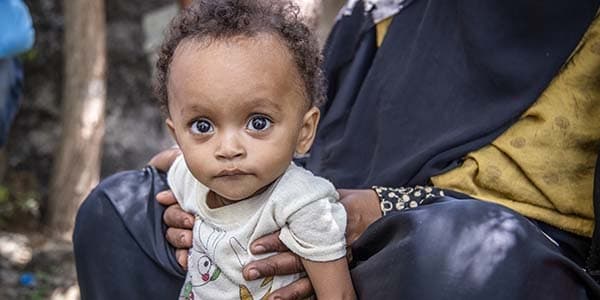Food Insecurity in America Is Cutting Childhoods Short
Across America, boys and girls are experiencing childhood differently. Some are getting the love, care and protection they need to develop to their full potential. But far too many others are not. And the disparities are shocking.
Today, 1 in 6 children in America struggles with hunger. Hunger is robbing too many children of the childhood they deserve. Among the nation’s poorest counties, alarmingly large numbers of children miss meals and go to bed hungry on a regular basis.
And while we know this is unacceptable, rates of child food insecurity in America remain high. 17% of all children are living in food-insecure households that lack access to nutrition sometime during the year - households that don't have enough nutritious food for every family member.
What Is the Definition of Food Insecurity?
Food insecurity is defined as limited or uncertain access to food. Food insecurity is a household-level economic and social condition of limited access to adequate food. It is distinct from hunger, an individual-level physiological condition that may result from food insecurity.[i]
How Many Children in the U.S. Are Food Insecure?
The USDA estimates that more than 11 million children in the United States live in food-insecure households as of 2018. That means that 1 in 6 children may not have consistent access to enough food for an active, healthy life. [ii]
Where in America Are Children Most and Least Protected from Food Insecurity?
Save the Children has examined data from more than 2,600 counties and county-equivalents in all 50 states to create a first-ever ranking of counties where children are most and least prioritized and protected from the factors that end childhood, including food insecurity.
In nearly every state, there are big gaps between the best and worst counties for children. Children living in the most disadvantaged counties are 3 times as likely to lack healthy food and consistent meals.
Over 1.6 million children in California and nearly 1.7 million children in Texas were at risk of hunger in 2017. New Mexico and Arkansas were the states with the highest child food insecurity rates: 24.1% and 23.6% respectively. This is more than twice the rates in Massachusetts and North Dakota.
What Are Food Insecurity Rates by County?
Across America, 84% of the counties where the most children struggle with hunger are rural and high poverty. Among the more than 2,600 counties examined, counties that ranked the lowest overall (in the bottom 50) are mostly rural, poor, concentrated in the south and are communities of color.
The highest food insecurity rate in the nation is in East Carroll Parish, Louisiana, where 40% of children struggle with hunger. This is comparable to child food insecurity rates in Bangladesh and Peru, and higher than the rates in Egypt and Mali. Slope County, North Dakota has the lowest child hunger rate in the country – 6%.
To compare food insecurity rates by county, visit our U.S Childhood Report Comparison Tool.
[i] Feeding America. Map the Meal Gap 2019: A Report on County and Congressional District Food
[ii] 2020 U.S. Complement to the Global Childhood Report
[iii] The Brookings Institute



